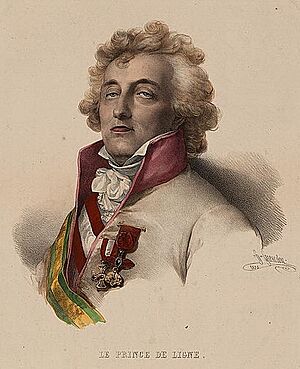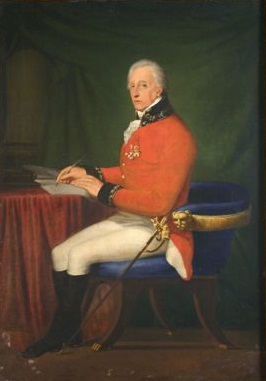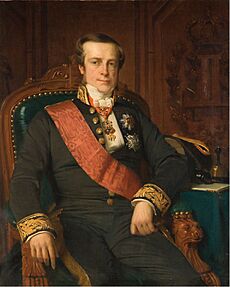Charles-Joseph, 7th Prince of Ligne facts for kids
Quick facts for kids Charles-Joseph |
|||||
|---|---|---|---|---|---|
 |
|||||
| Prince de Ligne | |||||
| Reign | 7 April 1766 – 13 December 1814 | ||||
| Predecessor | Claude Lamoral | ||||
| Successor | Eugène | ||||
| Born | 23 May 1735 Brussels |
||||
| Died | 13 December 1814 (aged 79) Vienna |
||||
| Spouse | Princess Franziska of Liechtenstein | ||||
| Issue | Marie-Christine, Princess von Clary und Aldringen Prince Charles-Joseph Antoine Prince François Léopold Prince Louis-Eugène Prince Adalbert Xavier Euphémie Christine, Countess Pálffy ab Erdöd Flore, Baroness Spiegel |
||||
|
|||||
| House | House of Ligne | ||||
| Father | Claude Lamoral, 6th Prince de Ligne | ||||
| Mother | Princess Elisabeth Alexandrine zu Salm | ||||
Charles-Joseph Lamoral, 7th Prince de Ligne (born May 23, 1735 – died December 13, 1814) was a famous field marshal and a talented writer. He was also a member of the important princely family of Ligne.
He fought in many battles during the Seven Years' War and later in the War of the Bavarian Succession. Charles-Joseph also went on an important diplomatic trip to meet Catherine the Great in 1787. In 1789, he led troops against the Ottoman Empire at the Siege of Belgrade.
From the 1770s, he wrote many books and essays. After losing his family's lands in the Austrian Netherlands during a war, he lived in Vienna. His three sons passed away before him, but his wife and four daughters lived longer. His grandson later became a well-known statesman in Belgium.
Contents
Military Career and Adventures
Prince Charles-Joseph de Ligne was born in Brussels, which was then part of the Austrian Netherlands. His father was Field Marshal Claude Lamoral, 6th Prince of Ligne.
He joined the Austrian army when he was young. He showed great bravery during the Seven Years' War. He fought in important battles like Breslau, Leuthen, Hochkirch, and Maxen. At Leuthen, he was a young captain. He suddenly found himself in charge of 200 men after his commanders were killed. He bravely led them to safety.
Rising Through the Ranks
During the Seven Years' War, Charles-Joseph was promoted several times. He became a major in 1757 and a colonel in 1759. By 1764, he was a general-major. In 1773, he became a Feldmarschall-Leutnant, which is a high-ranking general. He also received the Order of the Golden Fleece in 1772, a very special award.
He became a close friend and advisor to Emperor Joseph II. Charles-Joseph inherited his father's large estates and lived a very grand life. However, he returned to military duty during the War of the Bavarian Succession. This war was short and did not have many major events.
Travels and Diplomacy
After the war, Prince de Ligne traveled a lot. He visited England, Germany, Italy, Switzerland, and France. He spent time with royal families, military leaders, and important thinkers. He greatly admired Frederick the Great, the King of Prussia.
In 1787, he went with Catherine the Great on her journey to the Crimea. In 1789, he was part of the Siege of Belgrade. This was a big military event.
Soon after the siege, he was asked to lead a revolutionary movement in Belgium. Many of his relatives were involved. But he politely refused, joking that "he never revolted in the winter." Even though Emperor Joseph II suspected him, their friendship continued. After the Emperor died, the Prince stayed in Vienna.
In 1792, his lands in Belgium were taken over by France. He never saw his beautiful Château de Belœil again. He then settled permanently in Vienna.
Later Life and Famous Words
Charles-Joseph continued to serve at court in an honorary role. He was promoted to Feldmarschall (field marshal) on September 6, 1808. This was the highest military rank.
Even though he lost his estates, Charles-Joseph lived comfortably in his later years. He spent his time writing. He lived long enough to see the Congress of Vienna, a big meeting of European leaders. He famously said about it: "Le Congrès ne marche pas, il danse" (The Congress does not march, it dances). This meant it was more like a party than serious work.
People described him as one of the most charming men ever. He passed away in Vienna in December 1814, at 79 years old.
His Writings
Charles-Joseph de Ligne wrote many books and essays. His collected works filled thirty-four volumes. He left his handwritten notes to the Emperor's guard, where he was a captain.
One of his most important military books is Fantaisies et préjugés militaires (Military Fantasies and Prejudices). It was first published in 1780. This book is considered a classic for anyone studying military history. It discusses military topics in a lighthearted way. He even suggested creating an international academy for the art of war.
Another famous work he wrote was a fake autobiography of Prince Eugene of Savoy (1809).
Some of his other works include:
- Lettres à Eugénie sur les spectacles (Letters to Eugénie on Shows) (1774)
- Coup d'œil sur Belœil (A Glance at Belœil) (1781)
- Mélanges militaires, littéraires et sentimentaires (Military, Literary, and Sentimental Mixes) (1795–1811)
Family Life
On August 6, 1755, Charles-Joseph married Princess Franziska Xaveria Maria of Liechtenstein. They had seven children together:
- Princess Marie Christine Leopoldine (1757–1830)
- Prince Charles Antoine Joseph Emanuel (1759–1792)
- Prince Francois Leopold (1764–1771)
- Prince Louis Eugene Marie Lamoral (1766–1813)
- Prince Adalbert Xavier (1767–1771)
- Princess Euphemie Christine Philippine (1773–1834)
- Princess Flore Adelaide Caroline (1775–1851)
His grandson, Eugène, 8th Prince de Ligne (1804–1880), became a very important Belgian statesman. Another grandson, Count Maximilian O'Donnell von Tyrconnell (1812–1895), helped save the life of Emperor Franz Josef I of Austria in Vienna in 1853.
See also
 In Spanish: Charles-Joseph de Ligne para niños
In Spanish: Charles-Joseph de Ligne para niños
- Prince of Ligne
- Château de Belœil
- Edelstetten Abbey
 | Shirley Ann Jackson |
 | Garett Morgan |
 | J. Ernest Wilkins Jr. |
 | Elijah McCoy |



